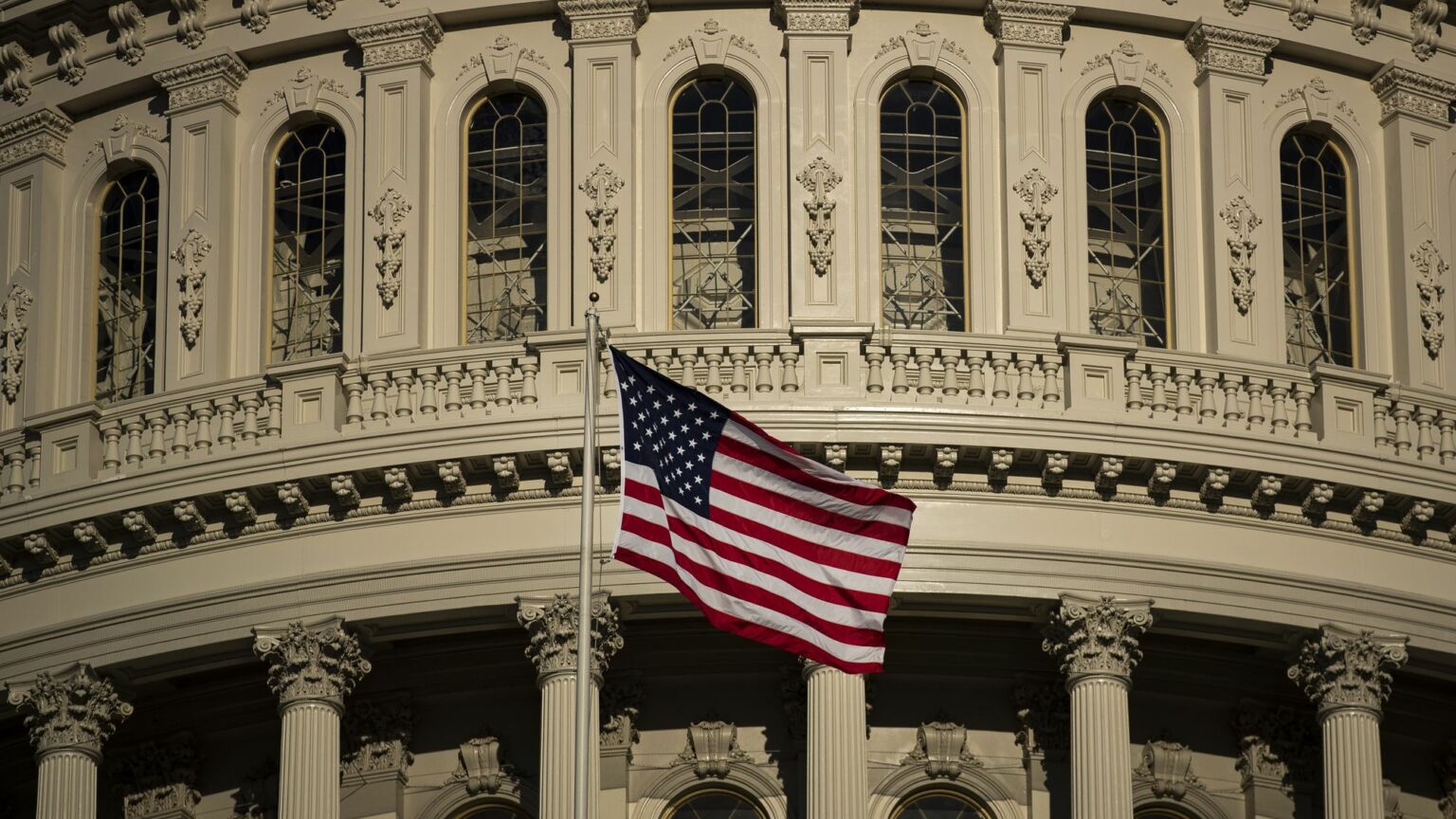America: a nation of giants led by pygmies
However dreadful its political class, the US’s fundamentals are overwhelmingly strong.

The United States today stands as a living contradiction to the ‘great man theory of history’. For the US is a great country led by small minds. In recent times, it has been ruled by a narcissistic moral reprobate and it is now being run by a cognitively deficient and scandal-plagued politician. There is a growing feeling, particularly among the young, that today’s America is diminished. Yet the US remains the world’s premier power, and its last best hope against a rising authoritarian tide.
So, how does an America led by mediocrities succeed? The secret sauce lies in two great assets – America’s geography and its constitution.
America enjoys an enormous expanse of arable land, the largest in the world, bigger than that of Russia and Ukraine combined, and nearly 100million acres more than China. It is not only by far the largest food exporter in the world, but it also leads all countries, including Russia and Saudi Arabia, in the production of fossil fuels, which are now being consumed more than ever. And not to be overlooked are America’s vast reserves of fresh water, the third largest on the planet.
These assets separate America from its largest rivals. Neither China nor Europe has adequate domestic energy supplies, making both ever reliant, like Tennessee Williams’ Blanche DuBois, on the ‘kindness of strangers’. Shortages and high prices are already hammering Germany’s industrial economy, from its dynamic mid-sized firms to the giants of its chemicals industry, despite the German government spending a massive half-a-trillion dollars on energy subsidies. Europe is now desperately firing up coal plants and reconsidering nuclear energy, but in the near-term its energy salvation will most likely lie in the oil fields of the Permian basin and other hotbeds of US energy production.
These geographic advantages, as well as the growing global suspicion about China, are turning America once again into the world’s primary destination for foreign investment, particularly in energy-intensive sectors like manufacturing. Japan, Germany and Canada are the top investors. German car giant Volkswagen sees the US as its best bet for ‘strategic growth’, especially given the business and political pressure against investment in China.
Yet perhaps even more than nature’s gifts, America’s greatest asset may lie in its centuries-old constitutional order. This is very different to the much ballyhooed, bureaucratic ‘rules-based’ system so attractive to Eurocrats and their American admirers. In Europe, decisions are based on the political fashions of the moment. Only a bureaucracy in thrall to green ideology, for instance, could have ignored all the warning signs of the current energy crisis and placed ever more bets on unreliable wind and solar in the name of stopping climate change – even while China, by far the world’s biggest emitter of CO2, is building more coal plants to power its homes and industries. Today, coal is now being consumed more than at any time in history.
Although it looks less ‘professional’ than the Brussels bureaucracy, the US’s constitutionally directed democratic governance has survived other chaotic periods like this one. As bad as our leaders may be, they are fortunately not omnipotent. In contrast, while unencumbered leaders can at times make enormous strides in catching up with more advanced countries, they almost always fail in the long run – bad news for Xi and Putin.
These lessons have still not been learned in academia and the media, which continue the old Western intellectual habit, visible in the 1930s and again in the 1960s, of eulogising foreign despotisms. For years now, many have regarded the ascendency of China’s ‘stronger government’ model as inevitable. Yet now, even China’s supreme leader admits its growth will be slowing and that surpassing the US in the medium term is no longer assured.
The business world’s turn away from China is gathering momentum. Even Apple is now preparing to shift its manufacturing away from China, bringing with it the firm’s enormous productive and engineering power. The ‘China Dream’ is rapidly fading as the country becomes ever more unequal, lacking in opportunities for both its vast working class and even for the educated. President Xi Jinping – like Mao, his authoritarian role model – has sacrificed China’s long-term prosperity in order to consolidate total political control.
Some ‘progressive’ observers in the West embraced China’s draconian Covid-19 policies when the pandemic first struck. They praised Zero Covid as the right approach, while the West, hemmed in by political considerations, was far slower to bring in lockdowns. But it is now clear that China’s handling of the coronavirus has actually been an embarrassing failure, the dire consequences of which, due to poor vaccination rates and inadequate hospital beds, are only just beginning to be felt.
Americans may have been divided by Covid. But a single national response – effective or not – was always going to be difficult in a country where power is separated by the constitution between the White House, elected representatives and judges who are approved by congress. In the US, after his claims that the 2020 election was stolen, Donald Trump was stopped not by his political opponents, but by his own allies – including vice-president Mike Pence, attorney general William Barr and many of his own judicial employees.
Now that Trump is thankfully out of power, President Joe Biden is also having his diktats overturned from below – this time by the conservative-majority Supreme Court. These include Biden’s attempts to scuttle immigration controls, his absurd pitch to unilaterally suspend college debts and his ‘racial equity’ agenda (the Supreme Court is even set to make affirmative action unlawful this year). Do not be surprised if Biden, who is increasingly in thrall to his party’s left, tries to impose draconian ‘climate emergency’ measures without congressional approval – only to have them tossed out, and rightfully so, in the courts.
Such constraints may upset authoritarians in both parties, but these limits are what keeps America from devolving into dysfunctional disaster. To many pundits, particularly on the left, these legal rulings are viewed with distaste – just as some extreme Trumpistas resent those Republicans who have embraced constitutional limits. This is why the constitution embodies the spirit of America – granting freedom to the individual against the power of the state, as well as the overreach of powerful corporations.
As Europe and China increasingly look to the state for employment and succour, Americans, as is their wont, are going off on their own. Following the pandemic, the US has experienced a rise in entrepreneurship, bolstered in part by former expats leaving China seeking new opportunities. In 2021, new business formations were up by 44 per cent from before the pandemic – the same figure for 2022, estimates the Economic Innovation Group, will set a historic record. A constitutional republic that guarantees individual and property rights remains a beacon to the hyper-ambitious.
America also continues to dominate critical technology sectors, with US firms accounting for close to 70 per cent of cloud-provider revenues. Even in hard times, Americans continue to start new businesses and, according to a recent Swedish study, America has far more billionaire ‘super-entrepreneurs’ than the EU, China and any other major competitor.
This continued primacy is not only important for Americans, but also for the remaining major democracies of Asia and Europe. We are living once again in an authoritarian era, as in the 1930s, where liberal values need a powerful champion. If Europe were pitted against Russia alone, as Finnish prime minister Sanna Marin pointed out last month, it would be ‘in trouble’ without the US.
The reality of the war in Ukraine and the looming prospect of a Chinese invasion of Taiwan should wake up even the West’s most deluded to the fact that autocracy is ascendant in the world today. And as the number of democracies diminishes, particularly in Latin America, the existence of what Thomas Jefferson called ‘an empire for liberty’ – one that does not seek to impose its will by might, but defends and promotes its values – has never been more important. The hope remains that, despite America’s awful political class, the US will, as it always does, find a way to bounce back – to the surprise not just of its enemies, but also much of its own intelligentsia.
As the world enters a difficult era, America remains the essential and dominant power – not through the brilliance of its leaders, but the excellence of its fundamentals. As German chancellor Otto von Bismarck once remarked: ‘God has a special providence for fools, drunkards, and the United States of America.’ To which I might add an old Yiddish saying: ‘From his lips to God’s ears.’
Joel Kotkin is a spiked columnist, the presidential fellow in urban futures at Chapman University and executive director of the Urban Reform Institute. His latest book, The Coming of Neo-Feudalism, is out now. Follow him on Twitter: @joelkotkin
Picture by: Getty.
To enquire about republishing spiked’s content, a right to reply or to request a correction, please contact the managing editor, Viv Regan.









Comments
Want to join the conversation?
Only spiked supporters and patrons, who donate regularly to us, can comment on our articles.